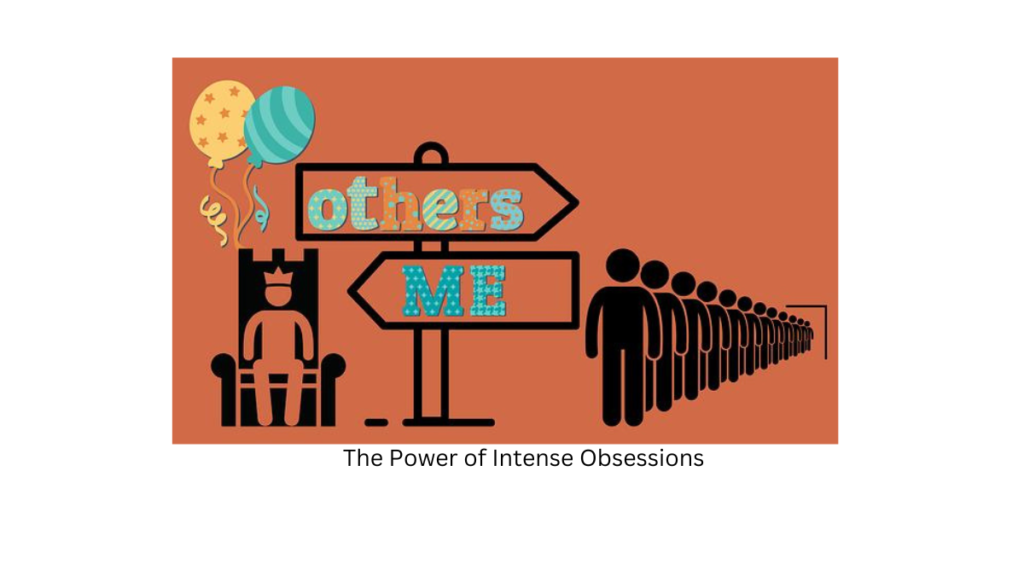Introduction

Intense obsessions are a curious aspect of human nature that have the power to drive individuals to excel and create, while also potentially leading to negative consequences. In this article, we delve into the intricacies of intense obsessions, examining both their advantages and drawbacks. By understanding the nuances of this phenomenon, we can gain insights into how to harness its positive aspects while mitigating its potential downsides.
“How can a deeper understanding of the intricacies, advantages, and drawbacks of intense obsessions provide insights into effectively harnessing their positive aspects while minimizing potential downsides?”
The Power of Intense Obsessions

- Unwavering Focus: Intense obsessions often bring about an unparalleled level of focus. When someone is deeply passionate about a particular subject or goal, they dedicate a substantial amount of time and energy to it. This laser-like focus can lead to exceptional achievements in that area.
- Motivation and Drive: Obsessions provide a wellspring of motivation and drive. They ignite a fire within individuals, compelling them to work harder, strive for excellence, and overcome obstacles. This internal motivation can propel them to push boundaries and reach new heights.
- Creativity and Innovation: Intense obsessions can foster creativity and innovation. When someone is consumed by a passion, they explore various angles and possibilities within that realm, often leading to groundbreaking ideas and novel approaches.
The Drawbacks of Intense Obsessions
- Neglect of Other Areas: While intense obsessions can drive exceptional focus, they can also lead to neglect in other important areas of life. Relationships, self-care, and diverse experiences may take a backseat as the obsession becomes all-encompassing.
- Burnout and Exhaustion: The relentless pursuit of a singular goal can result in burnout and exhaustion. Physical and mental well-being may be compromised as individuals push themselves beyond their limits, potentially leading to a decline in overall performance.
- Limited Perspective: Intense obsessions might result in a limited perspective. Tunnel vision can hinder the ability to see the bigger picture or consider alternative viewpoints, which could be detrimental in collaborative or dynamic environments.
Balancing Intensity and Well-being
- Setting Boundaries: Establishing boundaries is crucial to prevent obsessions from taking over every aspect of life. Allocating specific times for the pursuit of passion and other essential activities can help maintain balance.
- Diverse Interests: Encouraging a range of interests can broaden horizons and prevent fixation on a single goal. This diversification not only enriches life but also fuels cross-disciplinary insights.
- Self-Care and Reflection: Regular self-care and reflection are essential to ensure that the pursuit of passion doesn’t lead to burnout. Taking breaks, practicing mindfulness, and seeking support can contribute to overall well-being.
How does Intense Obsessions affect the brain?
Intense obsessions can have various effects on the brain, primarily through their impact on cognitive processes, emotions, and neural pathways. Obsessions are often characterized by persistent and intrusive thoughts, images, or urges that cause significant distress. While the exact mechanisms are complex and can vary among individuals, here are some ways in which intense obsessions can affect the brain:

- Neural Pathways and Circuits: Repetitive and intense obsessions can reinforce specific neural pathways and circuits in the brain. This could lead to a heightened sensitivity to certain triggers and an increased tendency for the brain to loop back to these obsessive thoughts. Over time, this can establish a neural pattern that is challenging to break.
- Hyperactivity in Brain Regions: Brain regions associated with threat detection, such as the amygdala, may become hyperactive in response to obsessive thoughts. This can contribute to the intense emotional responses often seen in individuals with obsessions, including anxiety and fear.
- Prefrontal Cortex Involvement: The prefrontal cortex, particularly the anterior cingulate cortex, plays a role in regulating emotions and cognitive flexibility. In individuals with intense obsessions, this region may struggle to suppress unwanted thoughts and maintain focus on other tasks, contributing to rumination and distress.
- Neurotransmitter Imbalance: Imbalances in neurotransmitters, such as serotonin and dopamine, have been linked to obsessive-compulsive disorder (OCD) and related conditions. These imbalances can influence mood, anxiety levels, and the brain’s ability to manage intrusive thoughts.
- Compulsions and Rituals: Often, individuals with intense obsessions engage in compulsive behaviors or rituals to alleviate the distress caused by their obsessions. The brain might temporarily experience relief or reduced anxiety when these rituals are performed, which can reinforce the connection between the obsession and the compulsion.
- Learning and Memory: Intense obsessions can lead to a form of negative reinforcement. When a person performs a compulsive behavior in response to an obsession and experiences temporary relief, the brain learns that the compulsion helps alleviate the discomfort caused by the obsession. This can reinforce the cycle of obsessions and compulsions.
- Structural Changes: Prolonged and severe obsessions might lead to structural changes in the brain over time. These changes could involve alterations in the size or connectivity of certain brain regions, which could contribute to the persistence of the obsessive thought patterns.
It’s important to note that intense obsessions are often a hallmark of conditions like obsessive-compulsive disorder (OCD). While these effects on the brain shed light on how obsessions can impact individuals, a comprehensive understanding requires consideration of genetic predisposition, environmental factors, and individual differences in brain structure and function. If you or someone you know is struggling with intense obsessions that significantly impair daily life, seeking professional help, such as therapy or medication, can provide effective strategies for managing these challenges.
How does Intense Obsessions affect your success?
Intense obsessions can have both positive and negative effects on your success, depending on how they are managed and channeled. Here are some ways in which intense obsessions can impact your success:
Balancing Intense Obsessions for Success:
- Set Boundaries: Establish boundaries to ensure that your obsession doesn’t overshadow other important areas of your life. Allocate time for your passion while also making time for relaxation, relationships, and self-care.
- Diversify Interests: Encourage a variety of interests to prevent tunnel vision. Diversification can provide fresh perspectives and insights that contribute to well-rounded success.
- Practice Self-Care: Prioritize self-care to prevent burnout. Regular breaks, healthy habits, and mindfulness can help maintain your mental and physical well-being.
- Stay Open-Minded: Remain open to new ideas and opportunities, even within the context of your obsession. Flexibility and adaptability are essential for long-term success.
In essence, intense obsessions can significantly impact your success, but finding the right balance between dedication, self-care, and adaptability is key to maximizing the positive effects while minimizing potential drawbacks.
Conclusion
Intense obsessions possess the power to be both a driving force and a potential pitfall. By recognizing their advantages and drawbacks, individuals can navigate their passions with greater awareness and control. Striking a balance between unwavering focus and holistic well-being is key to not only achieving remarkable success but also leading a fulfilling life. Through conscious effort and self-awareness, one can harness the positive aspects of intense obsessions while safeguarding against their potential downsides.





